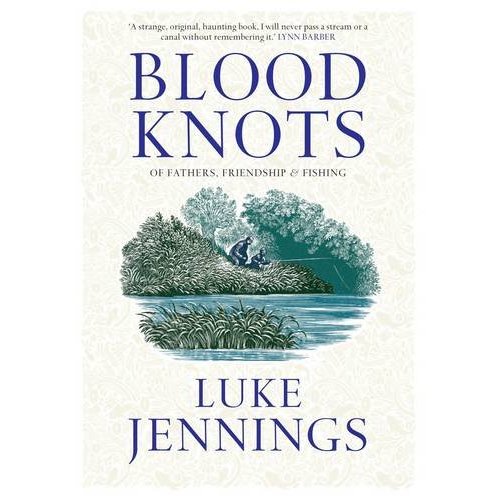Blood Knots (Of Fathers, Friendship & Fishing) by Luke Jennings (Atlantic Books – 2010)
Review by John Andrews
In ‘Blood Knots (Of Fathers, Friendship & Fishing’) Luke Jennings has produced an eloquent and deeply moving angling memoir. As with every angler’s story the fishing is constant but it is the people behind it that seize the reader and to borrow Lynn Barber’s words from the dust jacket will ‘haunt’ them. As such this is a tale about a lost world occupied by ghosts.
It is a book about the mysteries of Catholicism and of the dark arts of country pursuits, of mass, monks and inspirational masters, of hooded falcons, big skies, atmospheric waters and of a lonely planet. Throughout Jennings skilfully diverts the attention of the reader away from himself and onto those who influence him. Men like his late father Michael, a history undergraduate whose war ended in 1944 when the tank he was commanding in Holland was blown up during the advance on Ijsselstein and whose subsequent life threatening injuries and lifelong disfigurations did little to diminish his sense of humour and stoicism. When questioned by his young son about his experiences, Michael instructs him on how best to make cheese in the confines of a Cromwell’s turret, or recites the contents of letters that as an officer it was his duty to censor, ‘Dearest Maeve, I want you to know that you and Queenie are the best two fucks in Watford’.
Men such as Tom, the gardener at the family’s holiday cottage in Shropshire, who for one month coaches the young Jennings in the ways of roach and perch and shows him the need to wait and to be quiet. In the space of those thirty days, Jennings is taught how to fish, an act which his father prompts with the impulse purchase of a fishing rod but is unable to follow through, stuck, as part of him probably remained, in the cockpit of a burning tank somewhere in the flatlands of northern Europe. Unable to travel forward in time only backwards, an act which fishing ultimately teaches Jennings, ‘in the age burnished rituals – the securing of the reel in its seating, the steady tick of the ratchet as the line is pulled through the rod rings, the loop-and-draw-tight of the blood knot, the quiet swing of the cast – there is a kind of time travel. A return, for each, to the dewy spring morning of his life, when anything was possible’.
Men such as Robert Nairac, Jennings’ mentor at his secondary school Ampleforth College, an imposing place high up on the Yorkshire Moors where boys were sent at the age of seven and educated in the Amplefordian way, a steeping of contradictory catechismic values and of holy mystery, perfect for turning out good men but whose purpose, as its former headmaster Father Paul would say, was not to prepare them for life ‘but to prepare them for death’. No one embraced these ideals more than Nairac, a former pupil, who returned as a teacher and espoused them not in class but outside it coaching his pupils in the technique of breaking down a shotgun, training a hawk (it was Nairac’s own bird that was used in Ken Loach’s film ‘Kes’) and fishing for pike in the school lake or for wild brown trout in the moorland streams.
After such an education Jennings continues to fish, occupying the murderous towpaths of London’s canals and the manicured banks of Hampshire’s chalkstreams with equal intensity and in eternal conversation with his ghosts. He is fishing but he is never alone. With him at every cast are his father, who lived into his eighties, Tom the gardener, long gone, and Captain Robert Nairac (George Cross) as he was to become known, whose life was ended abruptly when he was savagely murdered in Ireland during the troubles. In every capture you sense Jennings’ personal loss. He remains, but only just, teetering on the precipice of life, perpetually gazing into the waters beneath him, his body and soul bound together by the blood knots of the book’s title and possessed by the need to fish and to search, an intrepid explorer of the abyss he so evocatively describes, ‘that tall, mysterious chamber of green, speared with light but vanishing into the darkness. What Aztec empires might that darkness hold? What escape might it represent?’
An escape that beckons from the moment you open ‘Blood Knots’ and begin to read. Barely into spring I can happily say that this is my book of the year. It is as relevant and contemporary as Yates’ ‘How to Fish’ and as affecting as Chaytor’s ‘Letters to a Salmon Fisher’s Sons’. I urge you to buy a copy on the day of publication. If you are an angler you will love it and if you are not you will devour it and may understand why others are.
copies of Blood Knots are now on sale in the Caught by the River shop, priced £15.00
